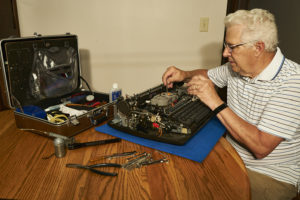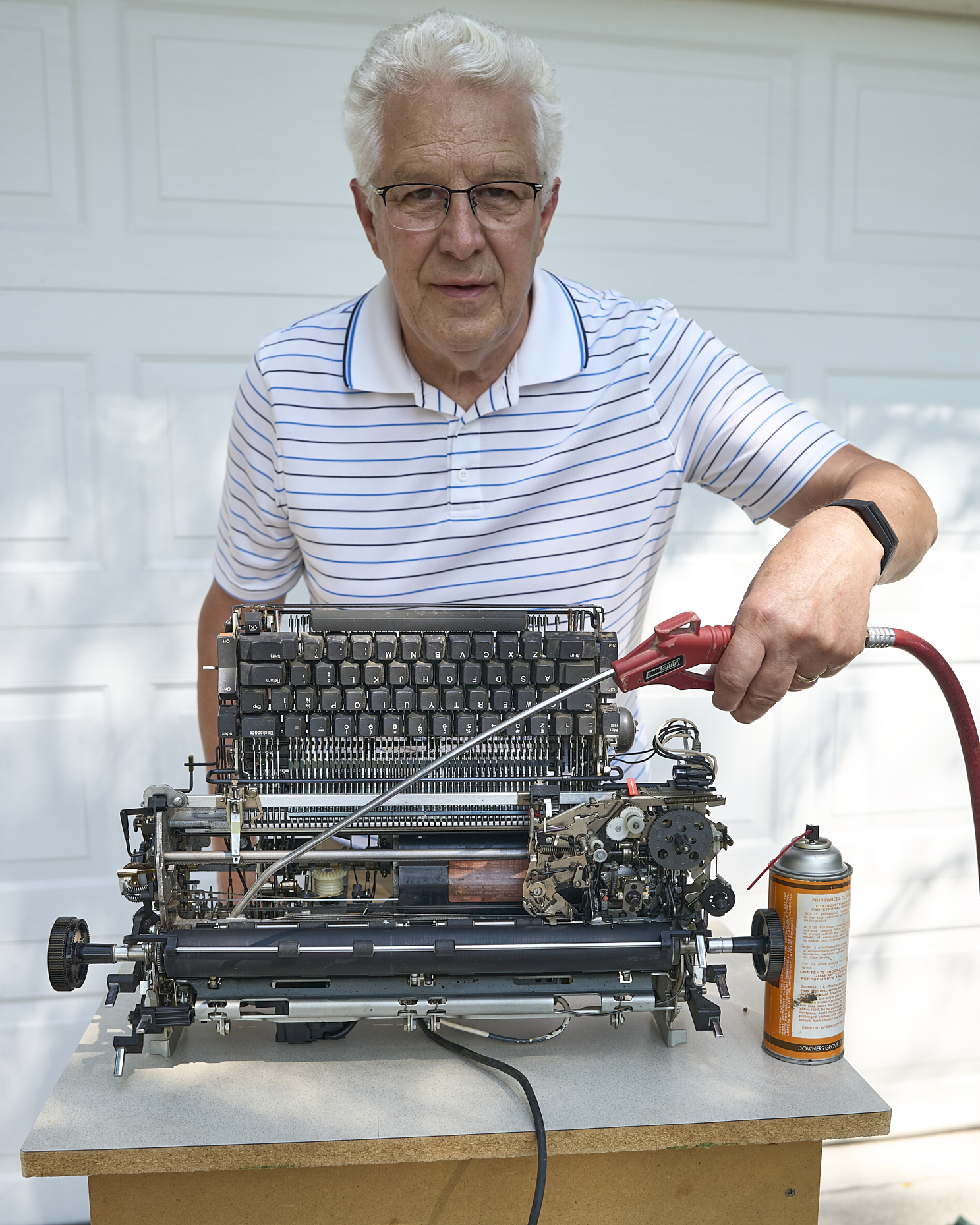By Nancy Carver Singleton
NEWTON — Technology made Vernon Overman’s career as a typewriter technician obsolete decades ago. But he’s found his old skill in demand during retirement as people rediscover the joy of typing on something other than a computer.
Maybe it’s the clicking, the tactile sensation or seeing what they’ve written come out of something other than a printer. But Overman is busier than ever, with little competition in sight.
Asked if he knows of others still working on typewriters, Overman said, “Everyone I knew has long since retired or passed away… People I used to buy parts, chemicals and cleaning supplies from have disappeared.”
Overman worked for IBM as a typewriter technician starting in 1973, then opened a Newton office equipment sales and service business in 1981. As computers began replacing typewriters, Overman kept his tools and maintained several local typewriters, including one for his wife, Janice.
Things started to pick up again around 2010. “People remembered us from the 1980s and started giving us calls that they had IBM typewriters that needed service, and they loved the idea of typing again.”
“They enjoyed sitting down and composing a letter or doing a business mailing on a typewriter as they had always done.” He serviced them in his free time. At the time, Overman was a field service technician working with copiers, faxes and printers. He retired in 2016.
Then he was asked by Phil Anderson III, owner of Anderson Book & Office Supply in Newton, to look at a customer’s IBM. Later, Anderson lost the person who serviced Smith Coronas, and Overman began maintaining those.
Overman maintains about 10 IBM Selectrics II and IIIs annually and roughly three to five Smith Coronas monthly. He gets a few Olympias and Remingtons each year.
Overman sees a number of Smith Coronas because Anderson sold them. Many IBMs are from people who bought or were given their office typewriters as computers were installed.
With an IBM, it may cost $125 to $150 to get it working. “For Smith Coronas, you may be looking at $50 or $60 as most people do not want to put a lot of money into it. So you try to get it functioning without a lot of expense.”
Cleaning is much of what he does. “That is basically my job — remove the dust and dirt and clean them up.” Liquid paper and erasers leave residue. The proper chemicals to clean typewriters are expensive and sold in quantities most people would not want.
Overman said there have been bad outcomes when typewriter owners use WD-40. “It works OK for a short time, but then it gums everything up.”
Repairs are difficult since parts are unavailable. Overman keeps four or five Selectrics for their parts and with metal is sometimes able to weld a replacement or use high-strength glue.
Typewriters he sees are from the 1960s or newer. Manuals are generally easier to maintain than electrics.
“Most of the manuals were made well. We don’t get a lot of problems. As long as people cared for them and didn’t drop them, they kept working. They’re a simple machine with no electric motors or belts to break.”
Many manuals, he said, were made when manufacturing was still an art. “They tried to make it as elegant as they could. They added things that were not necessary to make it a nice machine.”
Electric typewriters were mass produced overseas, with their belts and other components often later breaking. Rubber parts deteriorated.

Vernon Overman started noticing more demand for typewriter repairs and maintenance starting about a decade ago.
Where typewriters are stored also determines condition. “Most typewriters, if they were stored in a dusty, dirty environment — someone hauls it out to the barn —sometimes we can fix them, and sometimes we can’t.”
Anderson said Overman is meticulous. “With his experience, he is very capable of repairing different brands of typewriters. He is one of a kind. I believe there aren’t many left.” Typewriters are left at Anderson’s store, and Overman returns them there.
An IBM Selectric was mailed to them from Phoenix, Ariz. All others were brought in and from as far away as Dodge City and Winfield. “Once they hear about us, we get calls,” Anderson said.
Overman was an Air Force aircraft mechanic on a C-130 Hercules and a C-141 Starlifter from 1966 to 1970. After working at Cessna Aircraft, his technical skills helped him move to an IBM service center in Wichita.
The largest typewriters he worked on were the typebar IBM Models C and D weighing between 40 and 50 pounds. They had 18-, 20- or 24-inch carriages allowing legal documents to be placed sideways. “A lot of trucking companies used them because they could type through eight or nine layers of carbon paper.”
Overman was transferred to Hutchinson and then Newton in 1976, where he has lived since. “They kind of spread us out so (technicians) would not have to drive so far.”
Most IBM typewriters were in businesses and schools. He went to a number of high schools since typing was still taught. “They would have 20 to 30 typewriters in a classroom, which the students loved to break.”
An IBM was made to be serviced three to four times yearly because they were used eight to nine hours a day, sometimes six days a week, Overman said.
When an IBM is no longer used, the grease and oil gum up. “That is the biggest thing with IBM typewriters, trying to get them unstuck, re-lubed and re-oiled so everything will perform as it is supposed to.”
Maintaining typewriters is now more of a hobby for him than a business. “I have the tools, and it is more keeping up with my technician status so I won’t forget it.”
Initially, he was concerned about his long break in servicing more than just a few typewriters annually. “You think you have forgotten. Then you begin to tear into it and say, ‘Yes, that is how this works.’ ”
Overman compares it to working with old cars, which he also enjoys. “I still enjoy the mechanical machinery more so than the electronics. It is more satisfying to replace a mechanical component than an electric circuit board.”
Contact Nancy Singleton at ncsingleton@att.net.












